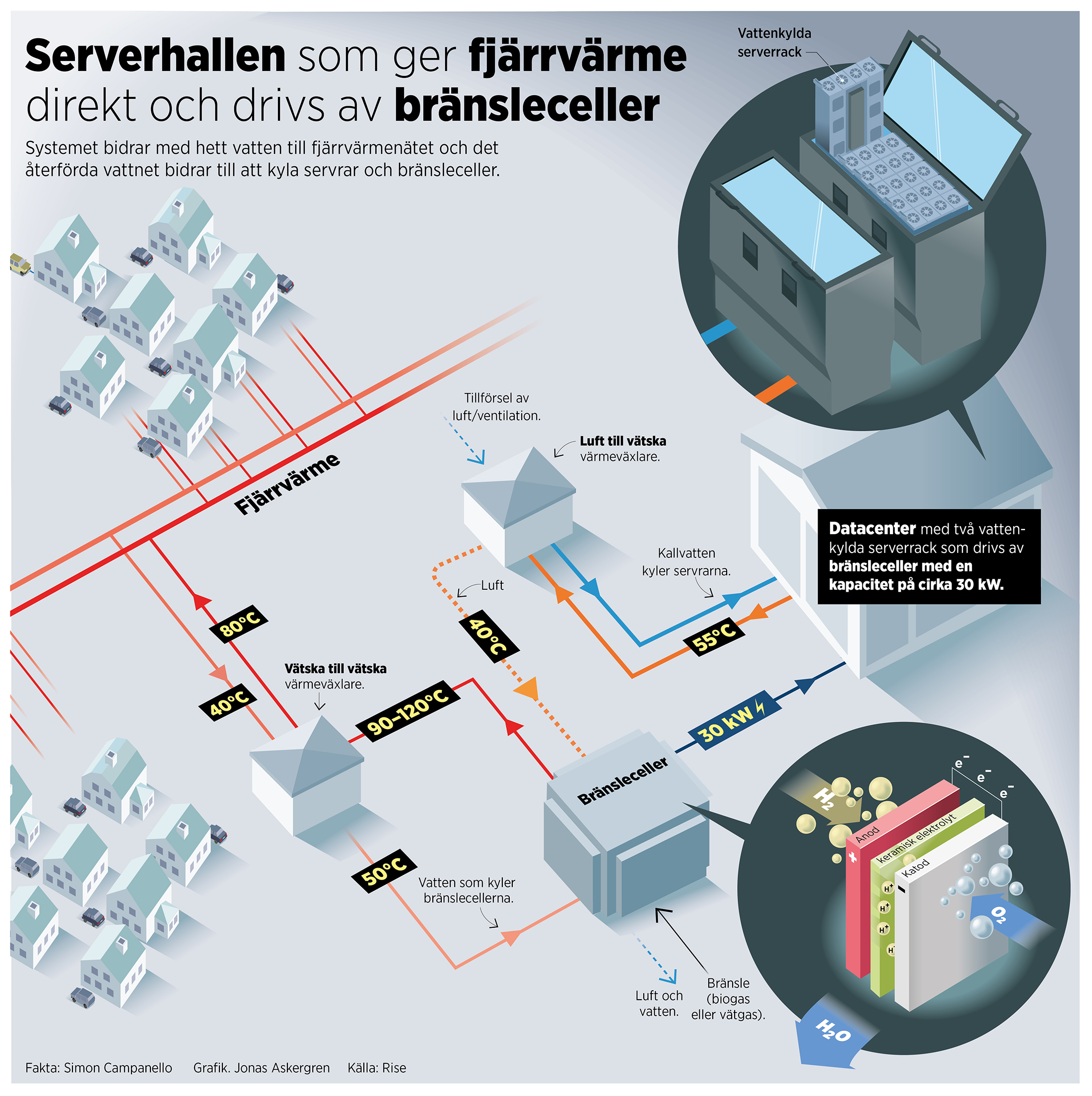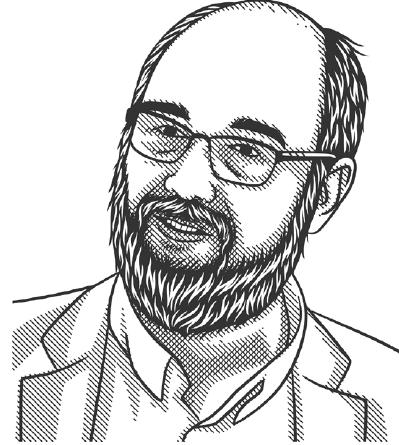RISE ICE national Infrastructure and Cloud datacenter test Environment
Date: 2020-07-27
News in short:- We have a new web portal https://www.ri.se/ice
- Our project fuel cell powered liquid cooled datacenter was covered in the magazine Nyteknik
- BTDC One was approved as "Participant in the EU Code of Conduct for Energy Efficiency in Data Centres"
- The challenges with connecting data centers to greenhouses are described in a video from the DC Farming project - check it out!
- Our work on holistic cooling control was presented at the OCP Virtual Summit
- Jon Summers were interviewed in the Datacenter Dynamics magazine on why we need to go into reverse to go forward
- Jon Summers were also interviewed by ESCI on the future for data center energetic waste
- Our project ICEedge on exposing 5G edge computing resources to developers has been kicked-off
- The project ANIARA, Automation of Network edge Infrastructure & Applications with AI, with Ericsson in the lead, was approved by Vinnova
- Our project together with RISE ETC on simplified solar installation with BIPV on prefabricated buildings for example datacenters was approved by the Swedish energy agency
- Our project on smart integration of power grids, micro grids and datacenters was also approved by the Swedish energy agency
- We are still active on our blog at the new web portal, on twitter @ICEbyRISE , and with a Linkedin group
- Follow us!
|
|
|
|
We have moved to a new web portal integrated on the main RISE web. It is now both English and Swedish versions. Here we describe our offerings and projects. It also contains our news blog, links to newsletters and twitter feed.
|
| ri.se/ice |
|
 |
| Illustration from Ny Teknik |
In the project WE.DISTRICT we have a concept of a liquid cooled datacenter in combination with a fuel cell aimed at edge deployments.
In cities it is expected to be lack of power and a fuel cell is a means to provide power to the edge.
The cool thing about the concept is that we aim at providing the heat from the fuel cell to the district heating network or any other industrial process needing high temperature heat. |
Read the article (in Swedish)
|
|
|
Our H2020 project, together with H1Systems, Ecocooling, Fraunhofer and Boden business agency, Boden Type DC One pilot datacenter was approved as Participant in the EU Code of Conduct for Energy Efficiency in Data Centers.
The EU Code of Conduct for Data Centers (Energy Efficiency) is a series of 150+ best practices that can be applied to a data center to make it more energy efficient. The practices can be implemented on legacy or new builds. It covers general management, IT procurement and operation, cooling technologies and operation, other datacenter ancillary equipment, UPS selection and operation, some design principles and finally measurement and monitoring to a granular level. It also references other datacenter concepts and guidance from around the world. |
|
|
Boden Type One DC meets the vast majority of these best practices and has been accepted into the participant scheme.
The consortium appreciates the help of John Booth from Carbon3IT Ltd who attended the Boden Type DC One site in Jan/Feb 2019 to prepare and assist the project with the EU Code of Conduct for Data Centers participant application forms pro bono apart from travel and accommodation costs.
Read more on the BTDC web site |
|
|
|
|
The DCFarming project wants to investigate the technical and socio-economic conditions for using waste heat from data centers for year-round cultivation in a sub-Arctic climate. In this way, create a more sustainable society where waste heat is utilized to make locally produced and organic vegetables.
A video was produced by the DC Farming project and the second workshop, which was conducted in the fall of 2019 with a focus on the future of data center farmers.
DC Farming is an innovation project financed by Vinnova, which is run in collaboration between RISE, Luleå University of Technology, and The Foodprint Lab architects.
|
Check out the video
Read more about the project
|
|
Jon Summers and Jeffrey Sarkinen presented at the OCP Virtual Summit on May 13th 2020 how holistic cooling control was used to achieve world-class efficiency demonstrated in the DCD Award winning project, BodenTypeDC.
Jeffrey presented – Profiling OCP Servers for Holistic Air Cooling and Jon presented – BTDC: A Practical Demonstration of World Class Efficiency
The work was done in collaboration with Alan Beresford from Ecocooling implementing holistic cooling control.
The target of the work was to find the sweet spot for servers using a wind tunnel and then apply it in a full datacenter to find the holistic sweet spot. |
|
|
 |
| Dr.Jon Summers. Illustration from DCD Magazine |
Jon Summers were featured in DCD Magazine Issue 36 – Are You Ready for Climate Change? in the section Future forecast.
His message was that we are now in the defining decade where the only way forward is to operate digital processing without losing information – so that the process can be reversed to recover its original state. At the center of thermodynamics and information theory is the idea of reversible computing, where the operations are adiabatic, and energy is constrained from leaving the system as heat. No heat implies no cooling and reduced energy consumption.
|
|
|
Our digital infrastructure has arrived at a historic crossroads, going forward with the present trajectory would lead to stagnation and spiraling cost due to physics. This decade will be defined by the technical challenges of reversible computing where the physics has no upper limit.
Read more |
|
|
Jon Summers, Scientific Lead of the ICE data center lab at RISE in Luleå, Sweden, talks to ESCI about the WEDISTRICT project, energy recovery from data centers and the future of fuel cells in energy re-utilization. |
|
|
ESCI: What does this increased digitalization means in terms of energy demand and how big is the environmental impact of data centers?
Jon Summers: Data centers do consume a lot of power. This fact has raised awareness and the interest of governments because the sector has a high electricity demand. Some consider it almost to be too great, since the output is hard to quantify, it being an intangible quality. In environmental terms, it seems almost a contradiction that while decarbonisation efforts run against an increase in energy demand, especially in regions where energy production is far from “green” and having a high carbon footprint, data centers have such high energy demands. That is why we move towards efficiency and environmentally positive energy generation for data centers.
Much more here
|
|
|
The project is a RISE internal funded project to enhance the capabilities at RISE and it is also collaboration with LTU, Luleå University of Technology to expose the resources to developers in the 5G testbed. |
|
|
| The objectives of the project is to develop an edge node (1/2 rack-size) concept and supporting software, to expose RISE data platform and edge resources to developers and researchers at RISE internal test & demo facilities and at 5G testbeds in Sweden,to develop technologies, usage, products and services for edge nodes hardware and software as well as edge applications, to strengthen Swedish companies to compete on the world market with edge applications and edge infrastructure and to enable Sweden to be world leading in different areas for example edge compute, IoT, mobility, AR/VR. |
|
Our Celtic Next project ANIARA together with Ericsson as coordinator and many other partners was approved for funding starting now. The total budget is about 10 M€.
The primary objective of the ANIARA project is to provide enablers and solutions for high-performance services deployed and operated at the network edge. To manage complexity, we need to take advantage of artificial intelligence to complement traditional optimization algorithms. Currently, deep edge network nodes will be deployed at locations not prepared for the power requirements of edge-centric compute. To answer this, we need to analyze requirements and develop methods to energy consumption.
|
| Read more |
|
|
|
|
The project application was approved in the call Digitalization enabling energy and climate-adaptation by Swedish energy. It is a joint project with Energiforsk that funds part of the project. The total budget is 2,2 MSEK over two years.
In this project, we want to study how subscriptions and tariffs affect the operation of an AI-controlled micro-grid consisting of solar cells, batteries and a datacenter. We also want to optimize datacenter with new strategies for controlling power, load and cooling based on knowledge of power- and micro-grids and to develop self-optimizing solutions.
Finally, we will develop smart tariffs using AI to benefit datacenter, micro- and power-grid owners. With better integration, the utilization of the grid can be increased. The project supports datacenters, power- and micro-grids with methods to transform the energy system. With energy and data science competencies at the ICE group, interdisciplinary collaboration is promoted and solutions for the industry are demonstrated. |
|
Our project on Simplified Solar Installation with BIPV on Prefabricated Buildings for example datacenters was approved by the Swedish energy agency in their E2B2 program.
The objective of the project is to increase the availability of BIPV for those buying prefabricated buildings (datacenter modules). By doing that the time from planning to a finished building will decrease, the total cost will be reduced, and the construction will be more resource efficient.
The calculation model developed in this project will assist the customer in determining electricity production as well as the financial savings due to solar PV. |
|
|
| Did you get this newsletter forwarded by a friend? Subscribe to get your own copy, 4 times a year. |
Register
|
|
|
